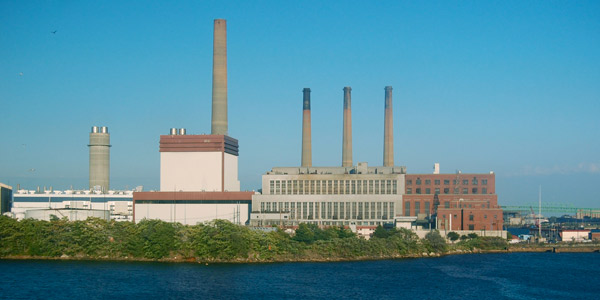FERC last month made additional alterations to its orders approving ISO-NE’s cost-of-service contract with Exelon’s Mystic Generating Station after the commission ruled on rehearing requests from the RTO, power generators and Connecticut regulatory entities (ER18-1639).
The commission clarified its multiple orders governing the contract after rehearing requests from ISO-NE, New England States Committee on Electricity (NESCOE), New England Power Generators Association (NEPGA), and Connecticut’s Public Utilities Regulatory Authority, Department of Energy and Environmental Protection and Office of Consumer Counsel. (See FERC Tweaks Orders on Mystic Contract.)
Commissioner Richard Glick, who had opposed the original 2018 orders and clarifications made to them in July, dissented. Commissioner Allison Clements, who was sworn in earlier in the month, did not participate in the proceeding.
Tank Congestion Charge
ISO-NE and NESCOE sought rehearing of FERC’s finding that the “tank congestion charge” in the fuel supply costs for Mystic Unit 8 and 9, which are fueled by a nearby LNG import terminal in Everett, Mass., was no longer needed. The groups argued that the charge was negotiated as a consumer protection in the agreement, saying a methodology for calculating tank congestion costs may be necessary for Exelon to demonstrate that ISO-NE ratepayers only pay for congestion attributable to serving Mystic.
The RTO signed the two-year, $400 million contract to preserve the region’s reliability after Exelon announced plans to shutter Mystic when its existing capacity supply obligations expire in 2022.
The commission agreed with those arguments, but it clarified that while Exelon must demonstrate that Mystic recovers only those costs attributable to serving it, the company will not be required to file the charge methodology. FERC also agreed with NESCOE’s request that these costs may be reviewed in the true-up process.

Mystic Generating Station, on the Mystic River in Everett, Mass.
Application of Clawback Mechanism
The commission was also persuaded by NEPGA’s arguments that the phrase “that were expensed” rendered the agreement’s clawback mechanism, modeled after provisions in MISO’s tariff, unjust and unreasonable. The mechanism requires Exelon to refund ratepayers if Mystic continues participating in ISO-NE’s markets after the termination of the agreement.
NEPGA noted that the phrase was a deviation from the MISO tariff’s language; FERC said it had accepted the change by reasoning that it was made to be consistent with ISO-NE tariff terminology.
“We agree with [NEPGA] that the commission’s intention is for the clawback mechanism to apply to costs ‘that are incurred’ rather than those that ‘that were expensed.’ We note that the term ‘expensed’ is not defined in the Mystic agreement and could be interpreted in many ways, including the method that [NEPGA] describe, thus creating a potential loophole that uses accounting treatment to avoid returning capital expenditures to New England ratepayers,” FERC wrote. It directed Exelon to remove the phrase.
Other Issues
But FERC said it disagreed with Connecticut that it erred by failing to apply the clawback mechanism to the Everett terminal. The state argued that Exelon should also refund repair and improvement costs to the terminal if it continues to operate after a separate cost-of-service agreement, one between the plant and the terminal, expires.
But the commission said that agreement is not under its jurisdiction. It did note “that ISO-NE, Everett and Mystic are free to negotiate a revenue crediting mechanism and include it in the Everett agreement, but such a mechanism is not required for Mystic’s jurisdictional rate to be just and reasonable.”
Glick Dissent
Noting his previous dissents, Glick said “the weight of the evidence across the commission’s New England fuel security proceedings shows that the retention of Mystic was aimed squarely at bailing out [an LNG] import facility.”
“If anything, the order underscores the extent to which many of the issues that are nominally related to Mystic really are, first and foremost, questions about the operation of the non-jurisdictional Everett facility that Mystic was retained to support,” Glick wrote. “Accordingly, I dissent from [this] order not because I necessarily disagree with any of the specific determinations made herein, but because I continue to believe that the commission exceeded its jurisdiction in the series of orders that brought us to this place.”



